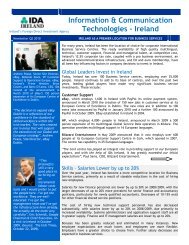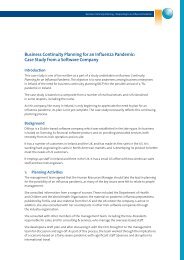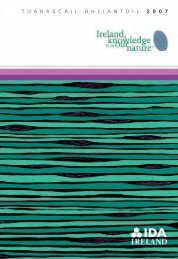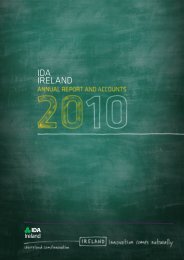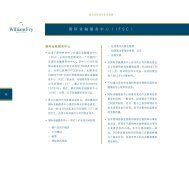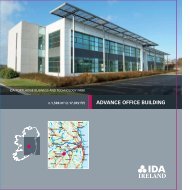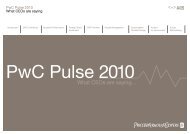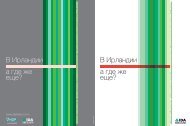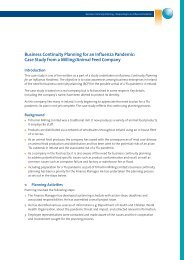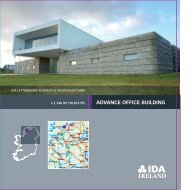Creativity - IDA Ireland
Creativity - IDA Ireland
Creativity - IDA Ireland
You also want an ePaper? Increase the reach of your titles
YUMPU automatically turns print PDFs into web optimized ePapers that Google loves.
» THE IRISH MIND<br />
‘Inawayyou<br />
can see this as<br />
the policy<br />
completion of<br />
economic and<br />
monetary<br />
union – the<br />
parts that we<br />
didn’t include<br />
10 years ago<br />
when we<br />
signed up to<br />
the euro’<br />
years ago – including us – we<br />
would be doing, we wouldn’t<br />
have believed it possible.<br />
“I think what keeps me so<br />
motivated is that it is endlessly<br />
possible. We keep setting hard<br />
challenges for ourselves and<br />
we always get there – in a complicated<br />
and expensive way at<br />
times, but we do get there!” she<br />
laughs.<br />
FINANCIAL GOVERNANCE<br />
The financial crisis of recent<br />
years, and the travails of<br />
Greece, Portugal and <strong>Ireland</strong>,<br />
have brought into stark focus<br />
some of the inherent weaknesses<br />
in the European project.<br />
It had clearly not foreseen,<br />
and was not prepared for such<br />
remarkable challenges. However,<br />
says Day, whose role also<br />
sees her closely involved in<br />
financial governance, there is<br />
a determination at EU level to<br />
ensure the necessary changes<br />
are made.<br />
“The thing now is to coordinate<br />
our policies much<br />
more, and to start with a much better set of indicators to see<br />
when things are getting off-track,” she stresses. “Look at the<br />
case of <strong>Ireland</strong> where wage competitiveness was being seriously<br />
eroded, and look at the correction that has taken place since the<br />
recession – spontaneously without anybody imposing it. Had we<br />
been monitoring that in more detail earlier on, we would have<br />
seen this bike starting to get out of control. So we want to have<br />
those kind of monitoring mechanisms in place. It’s not a guarantee<br />
that we will not face problems in the future, but it should<br />
mean that we do not face the same problems.<br />
“We are now, of course, in the business of drawing lessons for<br />
the future to ensure that we don’t have a repeat of what has happened,<br />
and I think one of the lessons is clear – that we need<br />
much more co-ordinated policy-making.<br />
“For years the Commission has been running after member<br />
states trying to get them to change decisions, but we are now putting<br />
in place a very tight system of economic policy co-ordination<br />
for the future,” she continues. “In the first half of the year the<br />
Commission will issue recommendations to each member state<br />
which they should then incorporate into their budgetary and economic<br />
policy for the following year. I hope that by getting ahead<br />
of the curve we will have more impact, and also make it politically<br />
easier for governments to accept recommendations.”<br />
The member countries have committed themselves to following<br />
the Commission’s recommendations as a general rule, or to<br />
explain in writing to the Commission should they not. “I think<br />
that will help,” says Day. “Peer pressure on governments to follow<br />
the right policies in future, combined with much better monitoring<br />
and early warning will, I hope, help us to do away with<br />
the problems of the past.<br />
“My belief is that something has changed in this crisis,” she<br />
says. “I think there is a better understanding now of the interdependence<br />
of our economies, and there is a determination on<br />
the part of many to ensure that we enact our economic policy<br />
differently in the future. In a way you can see this as the policy<br />
completion of economic and monetary union – the parts that we<br />
didn’t include 10 years ago when we signed up to the euro.<br />
“And then we also want to adapt the policies at EU level to be<br />
part of accompanying this process, so we are currently preparing<br />
a proposal for the budget from 2014–2020. We want that to<br />
be the Europe 2020 strategy in numbers, and to put the money<br />
into research, into infrastructures, into energy.<br />
“One of the things that we did recently was to fund an interconnector<br />
between the UK and <strong>Ireland</strong> so that the wind energy<br />
<strong>Ireland</strong> generates, above that which it needs, can be exported.<br />
This will help Europe to be more sustainable in its energy use,<br />
and of course <strong>Ireland</strong> can make very nice revenue from that. So<br />
it’s those kinds of initiatives we have in mind. The member<br />
26 INNOVATION IRELAND REVIEW Issue 2 Spring/Summer 2011



